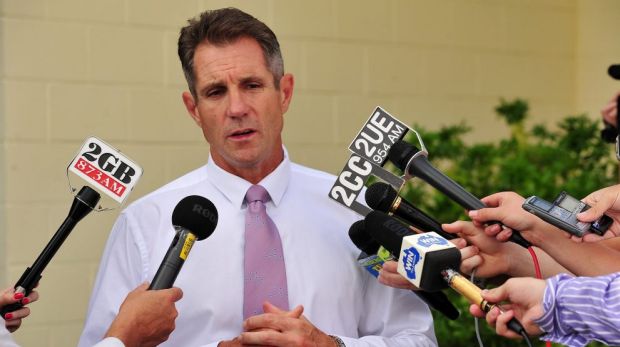
Raiders CEO Don Furner. Photo: Colleen Petch
Public health experts have criticised the Canberra Raiders for allowing McDonald’s to place coupons and advertising on tickets to a trial match at Seiffert Oval in February, fearing it will encourage obesity.
Tickets to the match against Newcastle Knights on February 21 feature a “buy a Big Mac get one free” coupon, valid for two weeks in ACT and Queanbeyan restaurants.
Professor of Health Sciences at Curtin University Mike Daube said the promotion was a “double hit that not only links unhealthy products with sport, but encourages extra consumption of junk food”.
“Top sporting teams such as the Canberra Raiders are all too willing to be involved with promotions for alcohol, junk food and gambling,” he said.
“It is absolutely inevitable that children will associate their sponsors’ products with sporting success and sporting idols.
“Clearly money trumps the health and wellbeing of supporters.”
Happy #AustraliaDay @RaidersCanberra fans! Picked these up today @jerseymegastore! #SeiffertTrial #weareraiders pic.twitter.com/SrOsF8iM5a — The Greenhouse (@TheGHRaiders) January 26, 2015
But McDonald’s corporate communications manager Chris Grant said there was nothing wrong with Raiders fans enjoying a Big Mac occasionally as part of a balanced diet.
“We reject the idea that McDonald’s shouldn’t be allowed to support great organisations like the Canberra Raiders,” he said.
“We have supported the club for a number of years and have always done so responsibly.
“As part of this partnership we support initiatives designed to get local kids involved and engaged with rugby league.”
Canberra Raiders chief executive Don Furner said he was not concerned about McDonald’s advertising on the tickets and thanked the restaurant chain for its continuing sponsorship.
“To bring a trial match like that to Queanbeyan we need the support of sponsors and McDonald’s stepped up to help,” he said.
Mr Furner said McDonald’s had a long history of supporting local junior sport and made efforts to provide healthy choice alternatives to many children and families.
Professor Daube said rugby league was not the only sporting code in Australia with issues with fast-food advertising.
“Tonight in Canberra the finals of cricket’s KFC Big Bash will see junk food being massively promoted at an event that captivates children around the country, while the current international cricket series is non-stop alcohol promotion,” he said.
Heart Foundation ACT chief executive Tony Stubbs has encouraged people not to be persuaded by fast food advertising during the final, which will be played at Manuka Oval.
“It’s ironic that KFC is the major sponsor of the domestic Twenty20 competition,” Mr Stubbs said.
“Even if you batted an entire Big Bash innings, you would still not have burnt off the kilojoules in their Zinger Stacker Boxed Meal,” he said.
A study by Wollongong University found junk food branding was shown more than 3000 times during cricket broadcasts last summer.
Almost all the branding was that of major sponsor KFC, which accounted for 99.7 per cent of the total junk food promotions shown.
ANU research conducted by Professor Stewart Lockie found 77 per cent of respondents supported a ban on junk food advertising during children’s television programs and 18 per cent opposed junk food advertising.
Professor Lockie said the simple message of the research was that “advertising junk food to children is no longer consistent with community standards”.
“Obviously, most people attending games are not young children but if the Raiders are hoping to attract families they should be aware that many parents are concerned about constantly exposing their children to junk food advertising and the association of these products with sport,” he said.
“I don’t think it is appropriate for sporting organisations to associate themselves with products that do not support healthy lifestyles.
“If promotions like this were ineffective the companies behind them would save their money.”
More than a quarter of ACT school children are overweight or obese but the number of students smoking and drinking is falling, a government study released in October showed.
The 2011-12 Australian Health Survey showed 26.3 per cent of ACT children aged five to 17 were overweight or obese.
